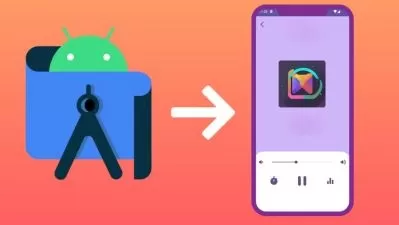Design Patterns in Java: Behavioral
Focused View
Bryan Hansen
4:00:54
17 View
00. Course Overview.mp4
01:35
00. Introduction.mp4
00:36
01. Why Learn Patterns - .mp4
01:00
02. Pattern Classifications.mp4
00:27
03. Which Patterns - .mp4
00:28
04. How Do We Learn Them - .mp4
00:39
05. Prerequisites.mp4
00:20
06. Next.mp4
00:17
00. Introduction.mp4
00:21
01. Concepts.mp4
01:33
02. Design Considerations.mp4
00:47
03. UML Diagram.mp4
00:49
04. Example - Logging.mp4
00:34
05. Demo - Logging.mp4
01:52
06. Exercise - Chain of Responsibility.mp4
00:25
07. Demo - Approver.mp4
06:07
08. Pitfalls.mp4
01:01
09. Contrast to Other Patterns.mp4
01:35
10. Summary.mp4
01:01
00. Introduction.mp4
00:18
01. Concepts.mp4
01:23
02. Design Considerations.mp4
01:27
03. UML Diagram.mp4
00:44
04. Example - Runnable.mp4
00:29
05. Demo - Runnable.mp4
01:43
06. Exercise - Command.mp4
00:26
07. Demo - Switch.mp4
06:05
08. Demo - State.mp4
03:59
09. Demo - Macro.mp4
08:44
10. Pitfalls.mp4
00:57
11. Contrast to Other Patterns.mp4
00:56
12. Summary.mp4
00:46
00. Introduction.mp4
00:23
01. Concepts.mp4
01:25
02. Design Considerations.mp4
00:59
03. UML Diagram.mp4
00:54
04. Example - Pattern.mp4
00:26
05. Demo - Pattern.mp4
01:54
06. Exercise - Interpreter.mp4
00:40
07. Demo - Interpreter.mp4
09:04
08. Pitfalls.mp4
01:11
09. Contrast to Other Patterns.mp4
01:24
10. Summary.mp4
00:50
00. Introduction.mp4
00:15
01. Concepts.mp4
01:37
02. Design Considerations.mp4
01:09
03. UML Diagram.mp4
00:56
04. Example - List.mp4
00:27
05. Demo - List.mp4
04:55
06. Exercise - Iterator.mp4
00:33
07. Demo - Iterator.mp4
07:37
08. Pitfalls.mp4
01:39
09. Contrast to Other Patterns.mp4
02:17
10. Summary.mp4
00:54
00. Introduction.mp4
00:19
01. Concepts.mp4
00:55
02. Design Considerations.mp4
00:47
03. UML Diagram.mp4
00:34
04. Example - Timer.mp4
00:19
05. Demo - Timer.mp4
01:40
06. Exercise - Mediator.mp4
00:30
07. Demo - Mediator.mp4
07:06
08. Pitfalls.mp4
01:00
09. Contrast to Other Patterns.mp4
00:56
10. Summary.mp4
00:44
00. Introduction.mp4
00:14
01. Concepts.mp4
01:05
02. Design Considerations.mp4
01:06
03. UML Diagram.mp4
00:49
04. Example - Serializable.mp4
00:18
05. Demo - Serializable.mp4
02:45
06. Exercise - Memento.mp4
00:31
07. Demo - Memento.mp4
09:07
08. Pitfalls.mp4
00:47
09. Contrast to Other Patterns.mp4
01:00
10. Summary.mp4
00:48
00. Introduction.mp4
00:18
01. Concepts.mp4
01:20
02. Design Considerations.mp4
00:50
03. UML Diagram.mp4
01:14
04. Example - Util.mp4
00:27
05. Demo - Util.mp4
02:50
06. Exercise - Observer.mp4
00:34
07. Demo - Observer.mp4
11:18
08. Pitfalls.mp4
01:10
09. Contrast to Other Patterns.mp4
01:12
10. Summary.mp4
01:07
00. Introduction.mp4
00:15
01. Concepts.mp4
01:15
02. Design Considerations.mp4
01:17
03. UML Diagram.mp4
00:54
04. Example - if - else.mp4
00:49
05. Demo - if - else.mp4
03:25
06. Exercise - State.mp4
00:40
07. Demo - State.mp4
16:21
08. Pitfalls.mp4
00:57
09. Contrast to Other Patterns.mp4
01:05
10. Summary.mp4
01:06
00. Introduction.mp4
00:19
01. Concepts.mp4
00:58
02. Design Considerations.mp4
00:51
03. UML Diagram.mp4
00:36
04. Example - Comparator.mp4
00:23
05. Demo - Comparator.mp4
04:55
06. Exercise - Strategy.mp4
00:21
07. Demo - Strategy.mp4
12:42
08. Pitfalls.mp4
00:47
09. Contrast to Other Patterns.mp4
01:28
10. Summary.mp4
00:55
00. Introduction.mp4
00:21
01. Concepts.mp4
01:19
02. Design Considerations.mp4
00:34
03. UML Diagram.mp4
00:40
04. Example - Collections.sort.mp4
00:40
05. Demo - Comparable.mp4
03:51
06. Exercise - Template Method.mp4
00:25
07. Demo - Template Method.mp4
08:42
08. Pitfalls.mp4
00:55
09. Contrast to Other Patterns.mp4
01:05
10. Summary.mp4
00:44
00. Introduction.mp4
00:17
01. Concepts.mp4
01:08
02. Design Considerations.mp4
00:46
03. UML Diagram.mp4
01:01
04. Example - API.mp4
00:18
05. Demo - Visitor.mp4
00:22
06. Demo - Without Visitor.mp4
05:12
07. Demo - Shipping Visitor.mp4
08:14
08. Demo - Display Visitor.mp4
02:04
09. Pitfalls.mp4
00:43
10. Contrast to Other Patterns.mp4
00:43
11. Summary.mp4
00:46
00. What Next - .mp4
01:12
Description
The Gang of Four Design Patterns explained and implemented using Java.
What You'll Learn?
This course is part of a 3 part series covering design patterns using Java. This part covers the behavioral design patterns, Chain of Responsibility, Command, Interpreter, Iterator, Mediator, Memento, Observer, State, Strategy, Template, and Visitor as defined by the Gang of Four. We look at examples in the Java API and code examples of each pattern.
More details
User Reviews
Rating
average 0
Focused display
Category
Bryan Hansen
Instructor's CoursesBryan is a Director at Software Technology Group, a consulting company based out of Salt Lake City, and has authored and taught numerous courses in Java. Over the years, Bryan has taught courses on Java Certifications, JPA, Hibernate, Spring, Spring MVC, Spring JDBC, Maven, RESTful Services, Selenium, Automated Testing, CAS, and various security topics.

Pluralsight
View courses PluralsightPluralsight, LLC is an American privately held online education company that offers a variety of video training courses for software developers, IT administrators, and creative professionals through its website. Founded in 2004 by Aaron Skonnard, Keith Brown, Fritz Onion, and Bill Williams, the company has its headquarters in Farmington, Utah. As of July 2018, it uses more than 1,400 subject-matter experts as authors, and offers more than 7,000 courses in its catalog. Since first moving its courses online in 2007, the company has expanded, developing a full enterprise platform, and adding skills assessment modules.
- language english
- Training sessions 133
- duration 4:00:54
- level average
- English subtitles has
- Release Date 2023/10/11











